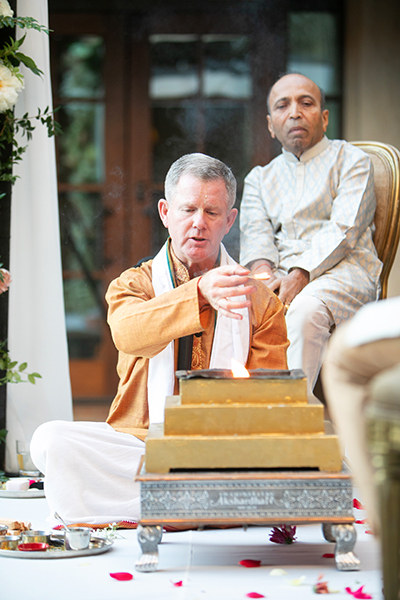Invoking all the Gods from Heaven
Mangalaashtak, also known as Mangalashtakam, is a traditional devotional hymn or prayer recited during Hindu wedding ceremonies. It is a set of eight verses composed in Sanskrit that offer blessings and good wishes to the couple as they embark on their marital journey.
The word “Mangalaashtak” is derived from two Sanskrit words: “mangala,” meaning auspicious or blessed, and “ashtak,” meaning eight. Hence, Mangalaashtak consists of eight verses, each expressing blessings and prayers for the well-being and happiness of the couple.
The Mangalaashtak is typically recited or sung by a priest or a knowledgeable person, and sometimes even by family members or close friends. It is often chanted during specific parts of the wedding ceremony, such as the tying of the wedding knot (Mangalya Dharana) or the Seven Steps (Saptapadi).

Dharmasetu Das performing Mangalaashtak
The verses of Mangalaashtak usually contain the following themes and blessings:
Invocation: The hymn begins with an invocation, offering salutations to various deities and seeking their blessings for a successful and blissful marriage.
Blessings for Union: The subsequent verses express blessings for the couple’s union, emphasizing love, companionship, and understanding. They invoke divine qualities such as eternal friendship, compatibility, and unity.
Wishes for Happiness and Prosperity: The Mangalaashtak extends wishes for a prosperous and harmonious life together, filled with happiness, good health, and material abundance.
Divine Protection: The verses often seek divine protection for the couple, praying for the elimination of obstacles, the bestowal of strength, and the guidance of higher powers.
The Mangalaashtak holds cultural and spiritual significance, as it invokes blessings from the divine and expresses well-wishes for the couple’s future. It encapsulates the values, ideals, and aspirations associated with a successful and fulfilling marital journey.
The specific composition and content of the Mangalaashtak can vary based on regional customs and personal preferences. Different regions and communities within India may have their own versions or variations of the Mangalaashtak, while still carrying the essence of invoking blessings and prayers for the couple’s marital bliss.




